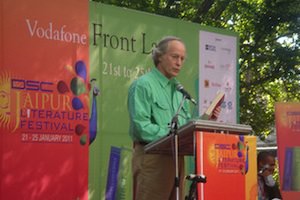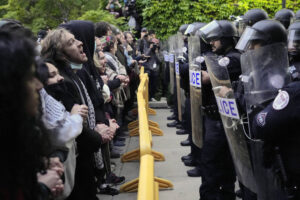Canadian Gothic
After reading Richard Ford's "Canada," you will never hear about a convicted criminal without considering the invisible children whose lives have been scrambled in ways they can't possibly understand.
“Canada” A book by Richard Ford
Toni Morrison, John Irving and now Richard Ford.
The month of May turned into a catwalk of America’s greatest senior novelists. Ford’s new book is the best of the lot, though, a magnificent work of Montana gothic that confirms his position as one of the finest stylists and most humane storytellers in America.
He’s well known, of course, for his Frank Bascombe trilogy, whose second volume, “Independence Day,” won the PEN/Faulkner Award and the Pulitzer Prize. As rich and durable as John Updike’s Rabbit quartet and Philip Roth’s Zuckerman series, the Bascombe novels are an insightful chronicle of middle-class life, infused with the economic and cultural anxieties of the late 20th century.
Now, Ford has left the suburbs of New Jersey two thousand miles away and delivered his most elegiac and profound book. “Canada” may strike recent fans as a departure, but it’s actually a return to the plains of his first celebrated story collection, “Rock Springs” (1987). Here in Great Falls, Mont., the author lays out a tale of one unexceptional family’s disintegration.
|
To see long excerpts from “Canada” at Google Books, click here. |
“First, I’ll tell about the robbery our parents committed. Then about the murders, which happened later.”
That unguarded opening comes from Dell Parsons, an English teacher on the eve of retirement. He’s looking back, without bitterness, at the calamitous events of his adolescence 50 years ago. He speaks in sentences that waver between unvarnished confession and life-tested judgments. There’s something unnerving about Dell’s calm, modulated voice, but the more he tells us, the more his temperament seems like a healthy response to traumas that would bury a weaker man.
The story begins when Dell and his twin sister, Berner, are 15, living an isolated life in a town that offers them no extended family or friends. Their mother is an intense, skeptical woman whose Polish-Jewish background accentuates her alienation. Their handsome Southern father never finds stable work after leaving the Air Force in 1960, but he expects the children to share his boundless optimism. He tries selling cars, then land, while dealing in stolen beef on the side — “a small, penny-ante scheme” that allows him to pretend he’s not really a crook.
Ford can be sympathetic and yet clear-eyed about the limits of these poor, mismatched people. His delineation of their characters is insistent without seeming relentless, moving further and further into the conflicted desires and misimpressions that motivate them. In a rented house riven by silent tensions and disappointments, Berner grows morose and sexually reckless; Dell, always the earnest student, throws himself into the study of chess and bees — miniature worlds that provide the fixed, predictable roles he craves.
When their father runs afoul of some Indian thugs and needs $2,000 fast, he concocts a ridiculous plan to hold up a bank, a decision that eventually sends him and his wife to jail and thrusts Berner and Dell into a world that has no use for them. After reading “Canada,” you will never hear about a convicted criminal without considering the invisible children whose lives have been scrambled in ways they can’t possibly understand.
“They were not the people to rob a bank,” Dell notes tactfully as he struggles to explain why his parents made the ruinous mistakes they did. On some level, he knows, “It’s a mystery how we are. A mystery,” but he’s intrigued by the interaction of fate and character. “They were … regular people tricked by circumstances and bad instincts, along with bad luck, to venture outside of boundaries they knew to be right, and then found themselves unable to go back.”As the book spins out this tragedy in Montana for 200 pages, I began to suspect the title was ironic, like Arthur Phillips’ “Prague,” which takes place entirely in Budapest. But Ford doesn’t do irony, and the title is an example of his tendency to foreshadow the events that will shape Dell’s life. Indeed, the novel boasts an almost proud disdain for suspense, holding our interest captive even while referring to future disasters that another author would have held back to surprise us later. It’s a demonstration not only of Ford’s skill but of his good faith, his willingness to sacrifice everything, including all the pyrotechnics of modern fiction, for raw, natural elegance and understanding.
And so, as foreshadowed, Part II finds young Dell whisked across our northern border to a dark room in Saskatchewan to escape social service agents. It’s a poorly conceived move that subjects the boy to the manipulations of a spoiled, cowardly guardian dogged by fears of retribution and willing to use anyone to avoid punishment — exactly the sort of mercurial man Dell can’t comprehend. In those frightening months of neglect and abuse, he becomes guarded and observant. His trust in the possibility of a good life, no matter what’s happening to him, is achingly tender. “My part was to find a way to be normal,” he says. “Children know normal better than anyone.”
But what still fascinates him after all these years is the deceptive resemblance of Canada to the United States. “If anything, the similarity to America made its foreignness profound,” he says. The people dress and, mostly, talk the same, the landscape is not very dissimilar, and yet he has crossed a border, entered a different country. That geographical transition quickly evolves into a compelling metaphor: the thin boundary between what’s acceptable and what’s illicit, between a functioning family and four strangers, between a happy son and a lost orphan. How easy it is, Dell knows, to slip from one side to the other without realizing it.
All of this arrives in the humble grandeur of prose that could teach anyone how to write better — even how to live better. I’m reminded of a long essay John Gardner wrote more than 30 years ago with the deadly title, “On Moral Fiction,” which accused contemporary novelists of abrogating their responsibility: “Either they pointlessly waste our time, saying and doing nothing, or they celebrate ugliness and futility, scoffing at good.” Gardner didn’t expect novels to be didactic or full of pat ethical instructions, but he believed they should have “a clear positive moral effect, presenting valid models for imitation, eternal verities worth keeping in mind, and a benevolent vision of the possible which can inspire and incite human beings toward virtue, toward life affirmation as opposed to destruction or indifference.”
In the most gracious way, Ford has done just that. Dell is haunted by that saddest lament — “If only” — the burden of what ruined men might have been, but he fundamentally rejects despair and cynicism in favor of what he’s learned to be true. Always a careful craftsman, Ford has polished the plainspoken lines of “Canada” to an arresting sheen. He’s working somewhere between Marilynne Robinson (without the theology) and Cormac McCarthy (without the gore). The wisdom he offers throughout these pages can be heard in the hushed silence that follows this harrowing tale.
Ron Charles is The Washington Post’s fiction critic. You can follow him on Twitter @RonCharles. He can be reached at [email protected].
© 2012, Washington Post Book World Service/Washington Post Writers Group
Your support matters…Independent journalism is under threat and overshadowed by heavily funded mainstream media.
You can help level the playing field. Become a member.
Your tax-deductible contribution keeps us digging beneath the headlines to give you thought-provoking, investigative reporting and analysis that unearths what's really happening- without compromise.
Give today to support our courageous, independent journalists.







You need to be a supporter to comment.
There are currently no responses to this article.
Be the first to respond.